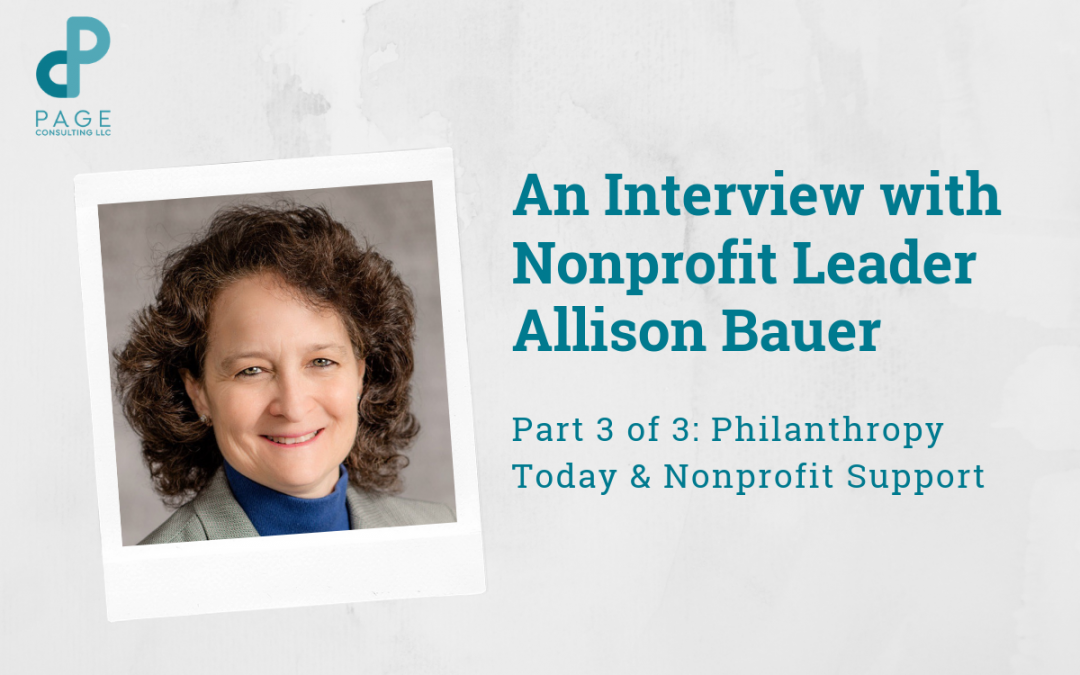In our two recent posts with industry expert, Allison Bauer, we covered philanthropy trends and the power of nonprofit data before diving right into the do’s and don’ts of grant applications. In our final post, we’ve saved the best for last as Allison discusses how we can bring together philanthropy and nonprofits to effect lasting change.
Allison Bauer is the former Senior Director for Health and Wellness at The Boston Foundation as well as the former Director for the Bureau of Substance Addiction Services for the State of Massachusetts. Recently, Allison joined Root Cause as Director of Partner Relations while continuing an expanded role as adjunct professor at Northeastern University.
This is the third part of a three part series.
Sonya: You recently started at Root Cause, a purpose-driven consulting group that exists to enable more people and families to achieve lifelong success. I would love to hear how you transitioned there from the foundation side and also help me understand how Root Cause is addressing some of the nonprofit challenges we’ve discussed over this series.
Allison: One of the things that I learned while working at The Boston Foundation was the wide range of nonprofit support needed – this might range from advice on how to come up with a compelling strategy, how to refine messaging on programs and mission, how to improve their fundraising work, and how to effectively evaluate their work.
It became clear to me during my time at The Boston Foundation that there was a strong need for technical assistance. Part of what has made my move to Root Cause a natural flow is that they are one of those providers of technical assistance to nonprofits, in addition to governments and to foundations.
But what I really like about Root Cause is that they do all of this technical assistance work around a specific set of guiding values and that’s what makes them unique. You aren’t doing anything to the community, you’re building with the community. There’s an equity lens and a values piece, and those are the components of Root Cause that are most appealing to me.
There are lots of technical assistance organizations out there, but at Root Cause we think about these issues in terms of measurement, learning, improvement, strategy, and collective action. We work to design, implement, and develop the strategies to help organizations achieve success, but it’s the principles behind this work that matter most: common purpose, involving people in the community, aiming for equity, making smart decisions using data and evidence in support of the work, and thinking big. And I think it’s important to say that we can still think big even when “acting small.” We leave an organization we work with better and stronger by working along these principles because they are so key to short- and long-term sustainability and success.
…it’s the principles behind this work that matter most: Common purpose, involving people in the community, aiming for equity, making smart decisions using data and evidence in support of the work, and thinking big.
Sonya: It does run a common thread through all of this. What resonates with me the most – especially through the lens of grant applications – is this idea of thinking big even while acting small. I think a lot of nonprofits really struggle to find ways to evolve their case on a year-to-year basis – to keep it fresh, especially for grant reviewers.
It’s critical to be able to bring that data and evaluation mindset into the process without having that be something that feels unreachable or unwieldy. Because evaluation and analytics don’t necessarily require a huge investment in resources – sometimes it’s simply about using the nonprofit data and metrics that are out there and making them work for your organization and mission.
Allison: Right. And if you are a service organization, you still need to be thinking about how to build wider connections so that it’s not just about throwing life-preservers to people – which is still really, really important – but that you’re working towards a world where people aren’t falling in the water in the first place. Smaller nonprofits that can work with other organizations in the same space and build collaborations are going to be more successful and naturally will help address these larger issues.
Sonya: How do you see the foundation-nonprofit relationship progressing in philanthropy today – or changing in the future?
Allison: This is one of the core issues that the Founder and CEO of Root Cause has taken of late. He has a Finding Common Purpose blog where he questions how we are going about making change in philanthropy and whether or not these methods aren’t just perpetuating the status quo. He is interested in exploring how we as philanthropic and nonprofit serving organizations address underlying issues.
There’s an element of dysfunction at play in philanthropy today because you have people with resources who have made a lot of money in business and expect to be able to identify a problem in the nonprofit sector and solve it. But the reality is that this isn’t a randomized controlled experiment with an input and an output – we have to work together to address underlying causes.
Some philanthropy – the more progressive philanthropy – is recognizing that no single sector is going to be able to fully address the underlying causes of societal problems in our country. The idea of multi-sector approaches and of collective action approaches is the direction we have to go, not just to address individual issues but also the social determinants and the underlying causes of the issue. We have to make sure that philanthropy does not become a cottage industry that is just trying to keep itself in business.
We have to make sure that philanthropy does not become a cottage industry that is just trying to keep itself in business.
Sonya: Do you have good book recommendations and resources for people that are aligned with what we’ve discussed today, specifically around this desire to take a hard look at philanthropy?
Allison: Absolutely. The books I would highly recommend are Winner Takes All: The Elite Charade of Changing the World by Anand Giridharadas; Grassroots Philanthropy by Bill Somerville, and the report, Passion and Purpose, written by Cambridge Community Foundation’s President and CEO, Geeta Pradham.
We would like to thank Allison once again for taking the time to share her perspective on philanthropy today. We’ve covered the use of nonprofit data and analytics, tips to secure nonprofit funding, and how philanthropy and nonprofits can work together to serve those in need while more effectively addressing underlying issues. We look forward to sharing more content like this through our “Ask the Experts” series – join our newsletter below to stay updated!

